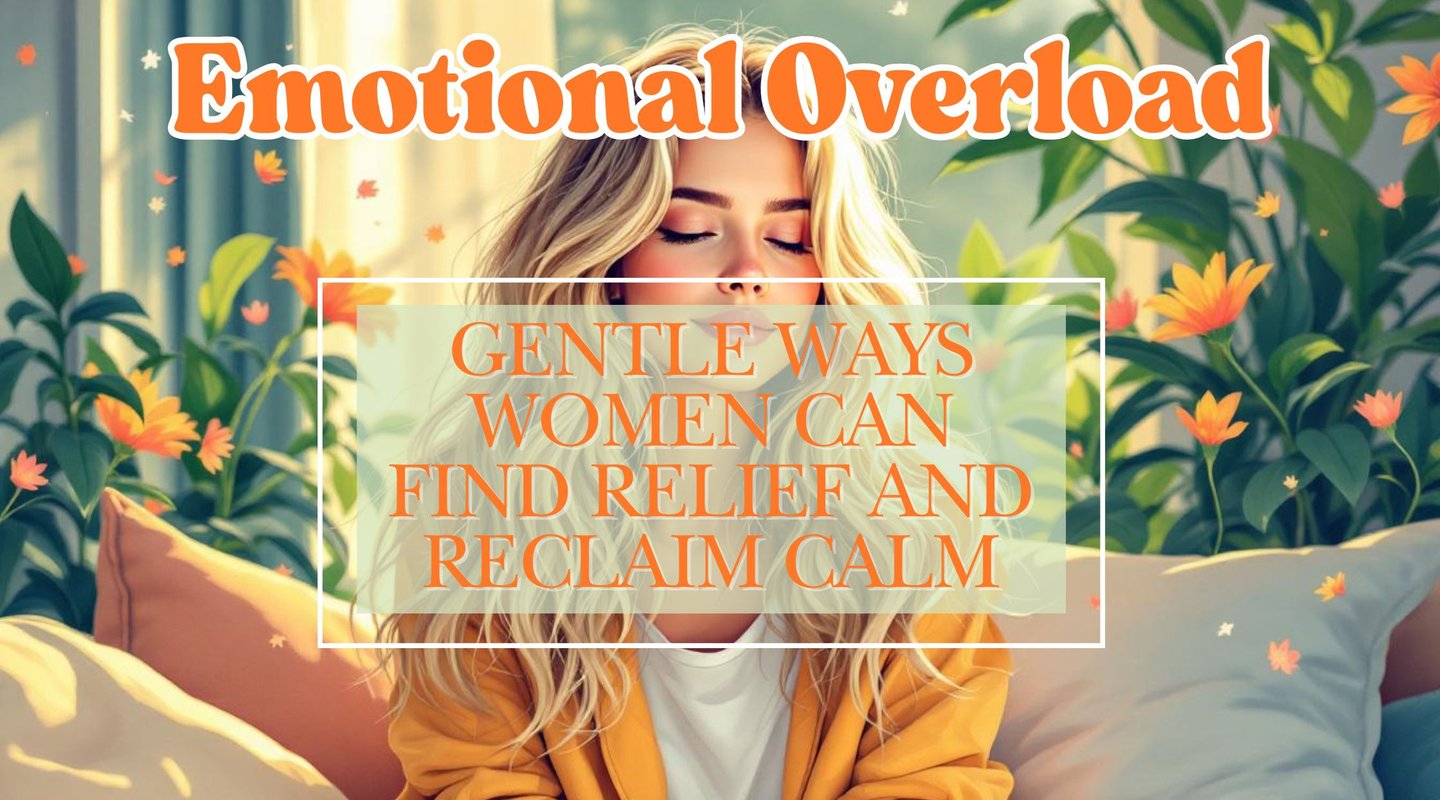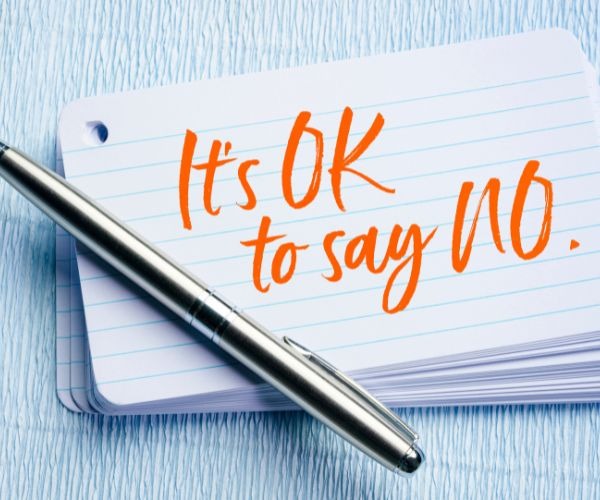Emotional Overload: Gentle Ways Women Can Find Relief and Reclaim Calm
Emotional Overload can feel heavy, but gentle steps can help you find relief. Discover simple ways to reclaim peace and truly care for yourself.
SELF CARE AND PERSONAL GROWTH
Shari Smith
6/12/202514 min read
As an Amazon affiliate, we earn commissions at no extra cost to you if you click our links and make a purchase.


Emotional overload feels like a wave crashing over you, leaving little room to breathe.
For many women, juggling demands at work, home, and in relationships can bring a flood of feelings—sadness mixed with frustration, exhaustion tangled up with worry.
It's more than just having a rough day. Emotional overload is when your heart and mind feel stretched past their limit.
If you've ever wondered why it all feels so heavy, you're not alone. This post gently unpacks what emotional overload really means, why women so often carry its weight, and how you can begin to reclaim your calm.
Here, you'll find practical steps, simple reminders, and a sense of belonging—because you deserve soft places to land even when life gets overwhelming.

How to Stay Calm When Emotions Run Wild: Emotional Regulation Tips
Watch Video...
Let’s look closer at what emotional overload really means and how it might be showing up in daily life.
If you struggle with feeling “too much,” you are in compassionate company here.
What Is Emotional Overload?
Emotional overload is when your feelings rush in so quickly and so strongly that it seems impossible to keep up.
It’s like water spilling over the edge of a brimming glass—steady one moment, suddenly too much the next.
For many women, this experience is not just a rare wave during stressful times, but a recurring tide that rises with everyday pressures.
Work, family, friendships, and caring for others can pull you in different directions until your own needs drown beneath it all.


Common Signs and Symptoms
Emotional overload rarely looks the same in everyone.
Still, certain signs often appear when you’ve reached your personal tipping point:
Tears come easily, even over little things that wouldn’t usually bother you.
Irritability or anger flares up quickly, leaving you snapping at loved ones for no clear reason.
Overwhelm feels physical: you may get headaches, muscle tension, or a heavy chest.
Decision-making seems impossible, even for simple choices like dinner or picking an outfit.
Sleep slips away, either because your mind won’t slow down or thoughts keep replaying at night.
Exhaustion runs deep—beyond feeling tired, it feels like you’re running on empty emotionally and mentally.
Disconnect from joy: favorite hobbies or even your children’s laughter feel distant or muted.
If you’re nodding along to these, know you’re not alone. Many women shoulder silent loads that grow heavy over time.
How Emotional Overload Differs from Everyday Stress
Stress is part of life—deadlines, traffic, arguments, or a packed calendar can make anyone frazzled. But emotional overload is different. Think of stress as a single pebble in your shoe, annoying but manageable. Overload is walking with both shoes full of rocks—each step becomes painful, focus slips, and you just want to stop.
Key differences between stress and emotional overload:
Stress usually comes and goes as you handle problems one at a time.
Emotional overload happens when you carry too much for too long, with no time to rest or recover.
Stress might make you tired; overload can make you feel powerless or even numb.
Stress responds to quick fixes: a nap, a chat, a walk. Overload lingers, often sticking around even after you try your usual coping strategies.
Women often push through daily stress until it swells into overload.
Between work expectations, emotional caregiving, and the unspoken “mental load” of keeping families running, you may find yourself on the edge without realizing how close you’ve come.
Everyday Examples Women Experience
Let’s bring it home with a few everyday moments where emotional overload can hide in plain sight:
You’re at work juggling emails and meetings, but all it takes is one more request to make you want to cry.
A friend vents about her day, and you feel guilty for not having the energy to support her.
Dinner burns in the oven, and suddenly it’s not just about food—it’s a wave of frustration at feeling like nothing is going right.
Your child has a meltdown, and you desperately want to comfort them, but part of you feels numb or shut down.
These are real, relatable moments. The reasons may seem small, but taken together, they weigh on your heart and mind.
Remember: emotional overload is not a personal flaw. It’s a sign that you’ve carried the load alone for too long. And there is always room for relief and support.
Understanding the Causes of Emotional Overload in Women
Emotional overload rarely arrives out of the blue.
Most often, it builds up slowly—pressure after pressure, until you can barely tell where your feelings end and your exhaustion begins.
For women, this overload doesn't have a single root. It comes from daily experiences, hidden expectations, and the way bodies and hearts move through life.
If you ever wonder why you're carrying so much, know that the causes are real, layered, and deserve your compassion.


Work-Life Balance Challenges for Women
Balancing work, home, and everything in between can feel like an impossible juggling act. Some days, you keep the balls flying; other days, everything comes crashing down.
Women often carry multiple roles:
Paid work: Whether you work in an office, from home, or outside the home, your job asks for your energy, focus, and time.
Home responsibilities: Laundry, groceries, bills, and planning everyone’s appointments—these tasks never make the headlines, but they fill your hours.
Care for loved ones: Children, partners, aging parents, or even friends in need—many women feel wholly responsible for the comfort and happiness of those around them.
Multitasking isn't a superpower—it's a recipe for exhaustion. When every demand feels urgent and there’s little time to rest, emotional overload becomes a near-constant companion. You may find yourself giving so much that there's nothing left for your own needs. And when no one notices how hard you’re working, it can deepen the sense of being invisible and unappreciated.
Impact of Hormonal Changes
Our bodies move through cycles, and each wave leaves its mark on emotions. Hormonal shifts—monthly, yearly, across a lifetime—can make feelings stronger and more unpredictable.
Periods, pregnancy, postpartum recovery, and menopause: all these stages bring changes that ripple through the mind and body.
Hormones like estrogen and progesterone rise and fall, impacting:
Mood swings: Even small triggers can feel huge when your body is already on edge.
Energy: Some days, you may wake up heavy with exhaustion no matter how much you sleep.
Sensitivity: Sights, sounds, and small stresses can hit with double the force.
Women are often taught to “push through” these changes or not talk about them at all. Silence can lead to misunderstanding, both from others and within yourself.
It’s easy to question, “Why am I so sensitive today?” when sometimes, it’s simply your biology asking for patience and care.
Social and Cultural Expectations
The world teaches women to care, to please, to hold it all together. These lessons start early and become ingrained, shaping how you see yourself and what you believe you “should” do.
Unwritten rules and hidden scripts often tell women things like:
Always be nurturing and calm.
Put others' needs before your own.
Don’t show anger or frustration.
Stay organized, poised, and cheerful—no matter what.
These pressures come not just from family, but from media, workplaces, and even friends. Expectations pile up quietly.
You carry the mental load—the invisible work of remembering everyone’s needs, planning, and anticipating problems. Over time, that emotional backpack gets too heavy.
Perfection is a myth, but the pressure to strive for it is real and relentless. When worth is tied to meeting other people’s expectations, self-care and rest fade into the background.
Eventually, emotional overload feels as natural as breathing—a silent force woven into your days.
Recognizing these causes is a quiet act of self-love. Each one is a reason, not a flaw. With awareness and understanding, the path to relief feels less lonely and more possible.
How Emotional Overload Affects Physical and Mental Health
Every woman’s body keeps score.
When emotional overload creeps in, it doesn’t just stay tucked in your feelings—it seeps into your bones, your breath, and your sleep.
The weight is not only emotional. Too much for too long starts to show up in aches, tiredness, and even the way you see the world.
Understanding how emotional overload touches every part of you is the first step to finding gentler rhythms and softer days.


Short-Term Consequences
When feelings surge and pile up, your body and mind respond in the only ways they know how. The effects often sneak in quickly, sometimes within hours or days.
Here’s what short-term emotional overload might look like:
Headaches: Pressure builds behind your eyes or in your temples, making it hard to focus or enjoy quiet moments.
Muscle tension: Your shoulders lock tight, your jaw aches, or your back throbs from holding in stress.
Fatigue: Even after a full night's rest, exhaustion lingers. Your limbs feel heavy, and it takes extra effort just to move through the day.
Sleep problems: You may struggle to fall asleep, toss and turn meeting invisible worries, or wake up before dawn with your mind racing.
Changes in appetite: Some women lose interest in food, while others seek comfort in eating, hoping to settle their hearts.
Feeling easily irritated or weepy: Emotions are close to the surface, and small things lead to snapping or tears that surprise even you.
Brain fog: Thoughts get sticky, ideas are hard to organize, and simple decisions feel like puzzles you can’t quite finish.
These short-term effects are like your body flashing warning lights. They say, “Slow down—something needs care.”
There’s nothing weak or broken about needing rest or a safe place to pause. These physical and mental signals are honest messages asking you to honor your limits.
Long-Term Health Risks
If emotional overload pulls up a chair and stays, the effects can deepen. The human body wasn’t built to carry stress this heavy forever.
When women are pulled thin over months or years, what starts as warning signs can grow into chronic struggles.
Long-term effects include:
Weakened immune system: You may notice more colds, infections, or that it takes longer to recover when sick.
Chronic headaches or migraines: With stress woven into your daily routine, pain settles in—refusing to leave.
Stomach problems: Ongoing worry can lead to bloating, nausea, or even heartburn that doesn’t go away.
Persistent anxiety: The feeling of being on edge never fully leaves. You might start to expect the worst, even when things are quiet.
Depression: Emotional overload sometimes grows into a numbness or deep sadness. Hopelessness takes root, joy feels out of reach.
High blood pressure and heart risks: Stress hormones make your heart work harder, raising your risk for heart disease over time.
Sleep disorders: Ongoing overload can lead to chronic insomnia, setting up a cycle that leaves you more worn out each day.
Isolation and withdrawal: It gets easier to turn down social plans, shut off phone calls, or avoid family—even when you crave connection.
Living with these risks can make daily life feel like walking through mud. Simple joys fade. Tasks you used to handle start slipping through the cracks.
If you find yourself here, know this: your experience is real, and your struggle is not invisible.
Emotional overload rewrites your body’s story, but stories can change. By seeing these signs for what they are—gentle warnings, not personal failures—you open the door to small steps toward rest, relief, and healing.
Practical Strategies to Manage Emotional Overload
When emotional overload takes hold, it can feel like being swept into a current that pulls you under.
The work of climbing back up isn’t just about finding a quick fix. It’s about reaching for small, gentle steps that add up over time.
There’s power in building habits that help you claim space, fill your cup, and ask for support without shame.
Here are ways women can move through emotional overload with care and courage.


Establishing Healthy Boundaries
Saying “no” is an act of self-respect, not selfishness. Healthy boundaries protect your energy and prevent burnout.
They help you draw lines between what you can hold and what you must put down.
Many women are taught to give, often to their own detriment, but boundaries are gifts you give yourself—and to others.
Think of boundaries as a fence around your emotional garden. Not every request, conversation, or demand needs to come inside.
Protecting your peace means listening to your gut and honoring your needs.
Set boundaries by:
Naming your limits: Recognize what feels like too much. Listen to your body’s signals—tension, exhaustion, or resentment are all clues.
Speaking simply and clearly: Short statements work best. “I can’t take this on right now,” or “I need some quiet time” are good options.
Following through: Hold your line kindly but firmly, even if it feels uncomfortable at first.
Here’s a gentle reminder: people who care about you will learn to respect your boundaries with time.
Every small act of self-protection is a step toward less overwhelm and more calm.
Self-Care Techniques
True self-care is not a luxury. It’s the fuel that keeps you moving, even when days are heavy. It can be simple, quiet, and deeply personal.
When emotional overload looms, think of self-care as tying an anchor to your own heart—helping you stay grounded no matter how big the storm.
Self-care looks different for everyone, but these steps help many women reconnect with themselves when they feel stretched thin:
Create a calming routine: Gentle rituals, like morning tea, soft music, or lighting a candle at night, can anchor you in the present.
Move your body: Walk, stretch, dance in your kitchen—movement softens tension trapped in muscles.
Limit screen time: Step away from the endless scroll. Give your mind and eyes a break, especially before bed.
Practice simple breathing: Inhale deeply. Exhale slowly. Repeat three times. This signals your body that it’s safe to relax.
Write it down: Jotting your feelings in a journal, or making a quick list of what’s on your mind, can bring relief and clarity.
The point is not perfection, but kindness to yourself in small doses. Daily self-care is like watering a plant a little at a time—slowly, you grow stronger.
Seeking Support and Professional Help
No woman is meant to carry emotional overload by herself. Sometimes support means leaning on those who know your heart.
Other times, it means sitting with a caring professional who can help you find your way through.
Reaching out for help is a mark of strength. It opens the door to healing and new tools for coping.
Here’s how you can welcome in gentle support:
Talk with trusted friends or family: Reach for those who listen without judging or fixing. Let them know what you need, even if it’s just a quiet presence.
Join a support group: You’re not alone in feeling overloaded. Sharing stories with others who understand can lighten your load and offer new ideas.
Seek professional help: Therapists, counselors, or mental health coaches can help you untangle deeper struggles. They offer guidance rooted in empathy and respect.
If you feel stuck, lost, or unable to cope, reaching for professional help is an act of self-compassion. You don’t have to wait for things to reach a breaking point.
There is always room for hope and change, and there are people ready to walk beside you.
Let these practices serve as reminders. Relief from emotional overload is possible, and you deserve each moment of calm you find.
When to Seek Help: Recognizing the Signs of Chronic Emotional Overload
There comes a point when carrying big feelings alone turns from difficult to dangerous.
Emotional overload can feel like walking through heavy fog—sometimes you don’t notice how lost you are until your feet grow tired and you can’t see a way forward.
In those moments, reaching out is not a weakness but an act of courage and hope. Every woman deserves care and relief before the weight becomes too great to carry.


Warning Signs That You Need Help
Pain and pressure have a language, and your body and mind will try to say what words can’t always express.
Chronic emotional overload is not always obvious at first—it can settle into your days as a background hum until one day, you finally hear the alarm bells.
Some signs stand out as red flags that your need for help is both real and urgent.
Here are signals that it’s time to look beyond self-help:
Everything feels heavy, every single day. Sadness, fear, or anger colors everything, often for weeks at a time.
You struggle to get out of bed. Even simple routines feel like climbing a mountain with tired legs.
You snap at people you care about. Irritability seems constant, and regret follows almost every conversation.
Simple decisions feel impossible. You pause over little choices, frozen by worry or confusion.
Numbness replaces emotion. Joy and pain both feel distant. You’re not yourself, but you can’t reach the person you once knew.
Sleep never brings rest. Night after night, you toss and turn, replaying stressful thoughts or feeling empty.
You pull away from loved ones. Calls go unanswered. Invitations are ignored. It feels safer to hide than connect.
Physical symptoms won’t quit. Headaches, stomach pain, chest tightness, racing heart—these have become your daily reality.
Thoughts of giving up appear. You wonder if those around you would be better off without you, or you wish it would just stop.
If any of these feel true for more than two weeks, or if you sense danger (to yourself or someone else), professional support is not just an option—it’s the wisest next step.
Your suffering matters. There is no shame in needing help for emotional overload, only proof that you care enough to want something better.
How to Find the Right Support
Choosing help is not admitting defeat. It’s choosing hope. Getting support for emotional overload comes in many shapes and sizes—each one just as valid and valuable as the next.
Start by thinking about the kind of care that might match where you are right now.
Here are ways you can reach out:
Talk to someone you trust. Share how you’re feeling with a friend, family member, or partner. Speaking your truth out loud can ease isolation and offer comfort.
Contact your doctor or a mental health professional. This might be a therapist, counselor, or support worker. They can help you put a plan in place and talk through your options.
Look for women’s support groups. Local and online groups exist for every experience. Hearing others’ stories can make loneliness melt away.
Consider resources at work or school. Many places have confidential counseling or employee assistance programs.
Reach out to a crisis line if things feel urgent. In moments when it feels like too much to handle alone or when you just need to talk, a crisis counselor can help you feel safe.
Trust yourself. You are the expert on your own life. If you sense something is wrong, you don’t have to wait for “rock bottom” to reach out.
No pain is “too small” or “not bad enough.” Your needs are real, and you are worthy of relief.
Choosing support is one of the bravest things you can do in the face of emotional overload.
Just as you would not walk on a broken leg, you don’t have to tough out a hurting heart.
Help is there, waiting patiently—because everyone deserves a gentle place to land.
Conclusion
Emotional overload touches so many women in quiet, powerful ways. When demands pile up, it can feel impossible to step back and breathe.
Naming this weight doesn’t solve it in one moment, but it opens the door to small and steady relief.
Every healthy boundary, every act of self-care, and every time you reach for help is a bold move toward more peace.
You do not have to earn rest or prove your strength by carrying it all. Your feelings matter.
Your limits matter. Trust that tending to your heart is an act of both courage and kindness. Hold space for yourself, and remember—there are softer days ahead.
Thank you for being here and taking care of yourself. If anything in this post spoke to you, consider sharing your thoughts or joining the conversation.
Your story is part of what makes this space safe and strong.






